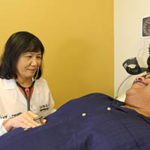Endometriosis is a painful gynecological disorder that is common among women in their 30’s and 40’s. The pain is caused by the endometrium, which normally lines the inside of the uterus, when it grows outside of it instead.
This can lead to serious health issues if not treated. Scarring in the pelvis, infertility, certain ovarian cysts (called endometriomas) and other gynecological problems are common issues that result from endometriosis. However, there are treatment options to manage symptoms and avoid further complications.
Non-surgical Options
Patients experiencing mild pain and discomfort may choose more conservative methods of treatment, such as the use of pain medications or home remedies.
For these patients, I may recommend taking anti-inflammatory drugs like Advil or Aleve to ease the pain on a regular basis and advise them to use heating pads or take warm baths during menstruation when the pain is worse.
If the patient is still experiencing pain, I may suggest hormone therapy, such as the use of birth control pills or contraceptive implants. Hormone medications can help limit the abnormal tissue growth, which can reduce or even eliminate pain during menstruation.

Surgical Options
If conservative therapies do not work, surgery may be the best option.
1. Laparoscopic Surgery
For patients who are trying to become pregnant, laparoscopic surgery, also called minimally invasive surgery, is the best solution. During the procedure, the endometriosis, endometriomas, and scar tissue are all removed through small incisions instead of one large abdominal incision.
This procedure is usually brief, and patients can often go home soon after the surgery is over. However, the procedure time and results depend on the patient and the amount of endometriosis that needs to be removed.
2. Hysterectomy
If the patient is no longer planning to conceive and is seeking a permanent solution to endometriosis, a hysterectomy may be the best option for treatment. This procedure includes the removal of the uterus and/or ovaries, eliminating the source of the tissue and the hormones that provide support.
However, if the ovaries are removed during surgery, it will cause the patient to enter menopause. This is known as surgical menopause and can cause menopausal symptoms such as fatigue, night sweats, and hot flashes. This can be controlled through hormone therapy, and I generally suggest low doses of estrogen for women who have undergone a total hysterectomy.
If you believe you are suffering from endometriosis and considering surgery, talk to your gynecologist about the best options for you.
 John Tramont, MD is an assistant professor of gynecology at UCF College of Medicine and a board-certified gynecologist at UCF Health. He specializes in complex gynecologic and urogynecologic conditions as well as chronic pelvic pain and menopause.
John Tramont, MD is an assistant professor of gynecology at UCF College of Medicine and a board-certified gynecologist at UCF Health. He specializes in complex gynecologic and urogynecologic conditions as well as chronic pelvic pain and menopause.


